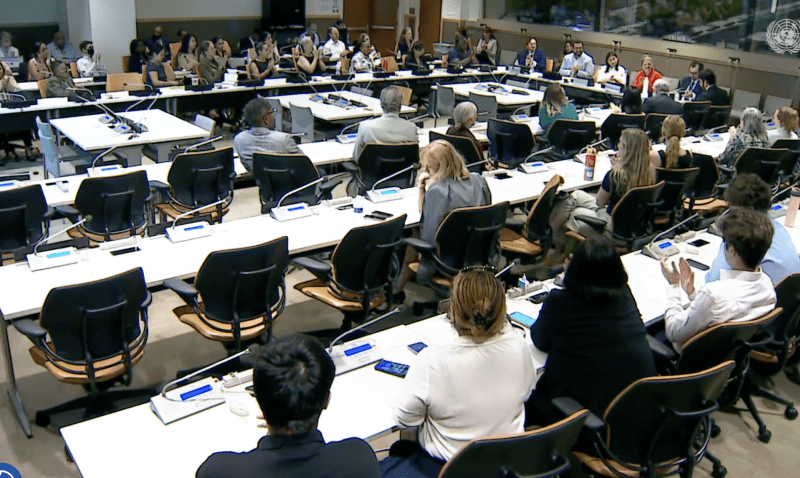
The Committee for the Promotion and Advancement of Cooperatives marked the International Day of Cooperatives with a high-level event on 8 July at the United Nations’ (UN) headquarters in New York.
Held in collaboration with the United Nations Federal Credit Union and the New York City Department of Small Business Services, the event highlighted the sector's role in tackling multiple global crises and working towards the 2030 Sustainable Development Goals (SDGs).
Moderator Konstantinos Papadakis, principal social affairs officer at the UN Department of Economic and Social Affairs (UN-DESA), said the meeting was “part of a broader effort within the UN system, including in the lead up to the second World Summit for Social Development, that will take place in Doha next November, to recognise the cooperative model, not as a niche, but as a proven, people centred approach to sustainable development”.
“And the momentum about the International Year of Cooperatives reflects that appetite for partnership, for participation, for solutions leading to peace and solidarity”, he said.
The meeting heard from Charles Katoanga, Director of the Division for Inclusive Social Development at UN-DESA. “Thirty years ago, at the World Summit of Social Development in Copenhagen, the world leaders pledged to place people at the centre of development and call for a global commitment to eradicate poverty, achieve full employment, and foster social integration," he said. "It was a bold vision for a just and inclusive world. Yet the richest 1% now owns more wealth than 95% of humanity. The urgency to act has never been greater,” he added.
He thinks cooperatives can provide an alternative as democratically governed, people-centred organisations that embody the principles in the Copenhagen Declaration and forge solutions to global challenges.
“From rural villages to urban centres, co-operatives are proving that economic success and social solidarity can go hand in hand,” he added.
Next, permanent representative of Mongolia to the UN, Ankhbayar Nyamdorj, described the cooperative movement in Asia-Pacific as a “very dynamic, evolving force with strong presence in various sectors and growing potential to contribute to the region's social and economic development.”
Amb. Yabesh G. Monari, the Deputy Permanent Representative of Kenya to the UN, also talked about his country’s co-op movement, which, he said, is an expression of a core Kenyan principle of Harambee, meaning ‘pull together’.
Delegates also heard from Dynishal Gross, commissioner at the New York City Department of Small Business Services, who explained why worker cooperatives are seen by the city’s government as an essential strategy to reduce inequality, and supported via the Worker Co-operative Business Development Initiative.
"In its current iteration, the city of New York's Worker Cooperative, Business Development Initiative strengthens and empowers the existing ecosystem of cooperative development, with tools, best practices, and resources for continued success.”
The meeting continued with a panel discussion on how credit unions can advance the SDGs, which featured contributions from Alison Coates, director of climate strategy and performance at Vancity credit union in Canada; David McAuley, CEO of Donore Credit Union in Ireland; and Thomas Belekevich, Costa Rica-based director of member services at the World Council of Credit Unions USA.
The event’s second session explored lessons from New York City’s Worker Cooperative Business Development Initiative (WCBDI), with contributions from Coby Kalter, executive director of business programmes at the New York City Department of Small Business Services; Anh-Thư Nguyễn, director of strategic partnerships at the Democracy at Work Institute; and Ricardo Lopez, corporate compliance officer at Cooperative Home Care Associates.
The WCBDI IS is helping to develop worker owned businesses, through the Owners to Owners programme, a hotline launched during the COVID crisis that enabled business owners in New York City to learn about worker ownership as a succession planning strategy.
“By investing in worker ownership, New York City is creating an example of what it might look like to try to create a more equitable economy, in perhaps the most inequitable city in the world, and how to create a tide that lifts up all boats,” she said.
Joao Martins, from the National Union of Family Farming and Solidarity Economy Cooperatives (Unicafes) in Brazil, explained how family farms are contributing to the SDGs in the run up to the COP30 taking place in Brazil later this year.
“We believe cooperatives must be at the heart of [the UN] Pact for the Future, and central to the deliberations of the Second World Summit for Social Development, not as passive recipients of aid, but as co-creators of development models rooted in solidarity, equity and collective wellbeing,” he said.
Mr Katoanga concluded by reiterating the importance of the UN IYC. “Let us together support and leverage the cooperative model to build a more just, inclusive, and sustainable world for generations to come,” he concluded.
Watch the session recording here.
https://www.youtube.com/watch?v=WPlmuLF9R7Y&feature=youtu.be
Read COPAC’s report here: https://www.copac.coop/international-day-of-cooperatives-2025-spotlights-financial-and-worker-co-ops-at-un-headquarters-in-new-york/




